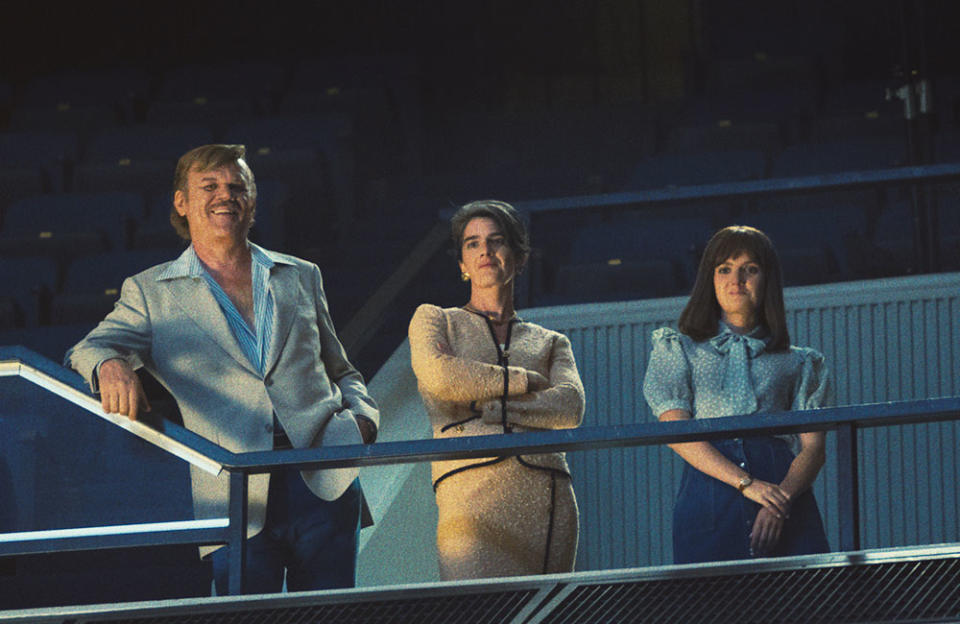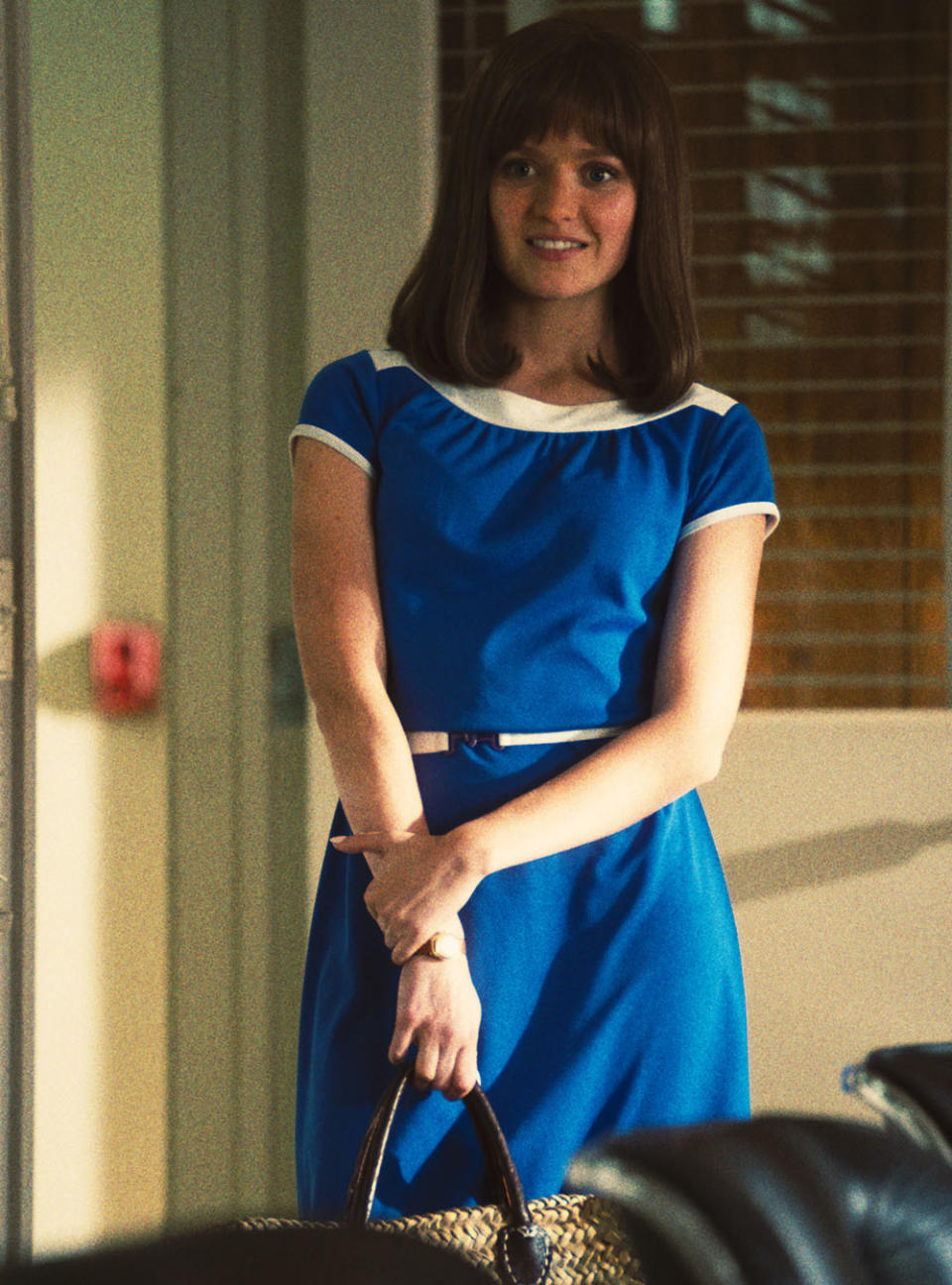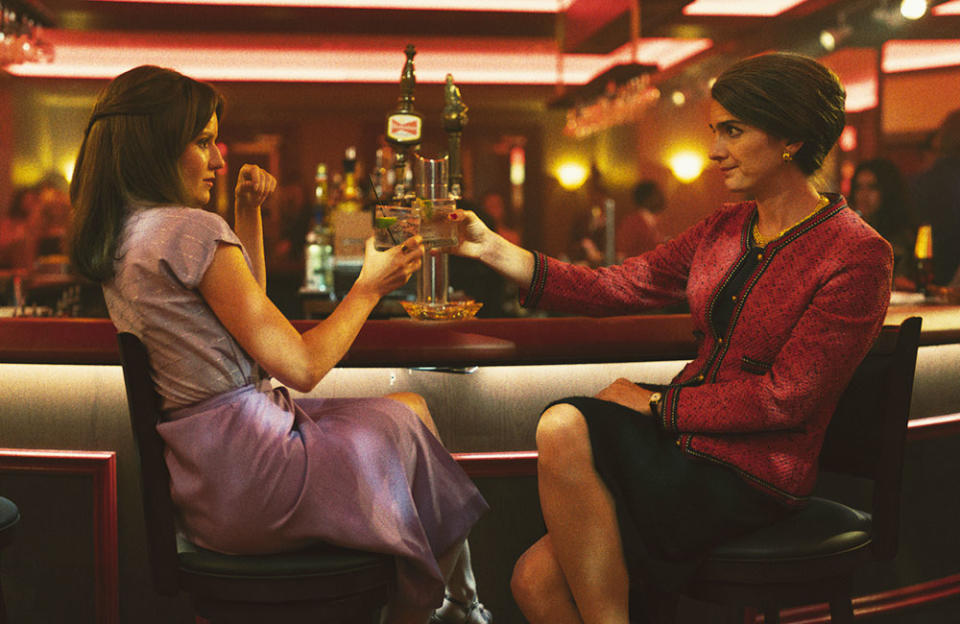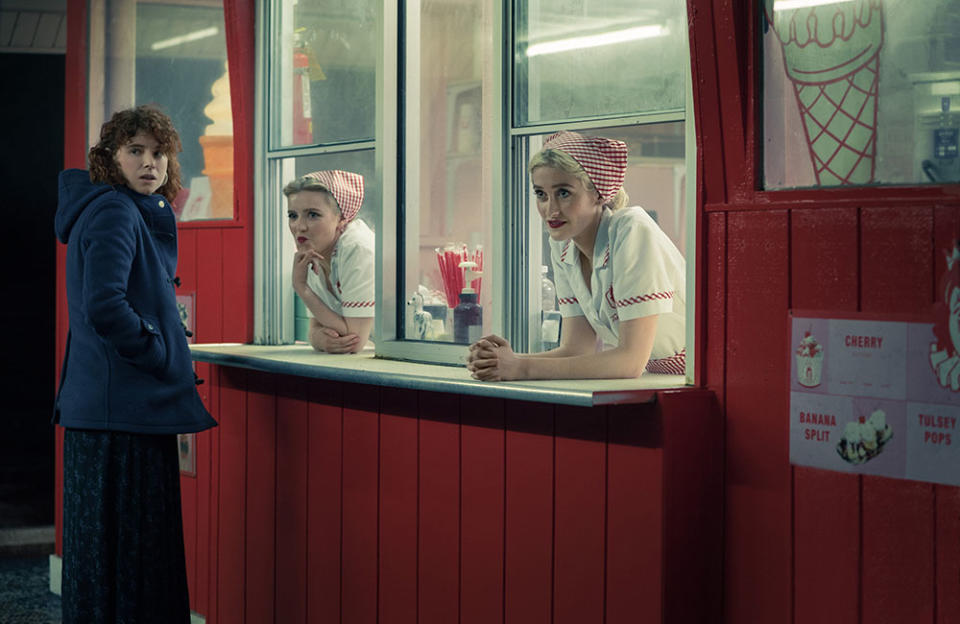‘Winning Time’ Star Hadley Robinson on Jeanie Buss’ Complexity and Her Christian Bale Bond
- Oops!Something went wrong.Please try again later.
- Oops!Something went wrong.Please try again later.

[The following interview contains spoilers through episode six of Winning Time: The Rise of the Lakers Dynasty.]
Hadley Robinson has only been acting professionally for a few short years, but she’s already worked with the who’s who of the industry, including Sally Field, Christian Bale and Greta Gerwig. The Juilliard alum — who currently plays Jerry Buss’ (John C. Reilly) daughter and aspiring executive Jeanie Buss on the Adam McKay-produced Winning Time: The Rise of the Lakers Dynasty — appreciates how intricately her character is written, especially with regard to Jeanie’s view of her father’s love life.
More from The Hollywood Reporter
Frank Langella Exits Netflix's 'Fall of the House of Usher' After Misconduct Investigation
'The Righteous Gemstones' Director Jody Hill Inks HBO Overall Deal (Exclusive)
Tribeca Festival Sets Jennifer Lopez Netflix Doc 'Halftime' as Opening Night Film
“I think we expect Jeanie to almost have a Cordelia in King Lear sort of moment where she confronts her father and is honest and puts her foot down and says, ‘This isn’t right.’ But instead, she does the inverse and says, ‘I’m going to use this to my advantage,’” Robinson tells The Hollywood Reporter. “She has the book of all his young mistresses and says, ‘OK, how can we use this?’ So she acknowledges the fact that this is what men want, or at least that’s what she assumes from watching her father. So because she doesn’t acquiesce, I think that allows for more complexity in her character.”
The controversial HBO series has already been picked up for a second season, and Robinson hopes that she can walk in Jeanie’s footsteps for a little while longer.
“I think it’d be very doable, and it is all juicy stuff. So hopefully I can take a whack at that stuff up until [age] 35. That is definitely the hope,” Robinson says. “We’ve seen one version of Jeanie, but her transformation is the most interesting part for me. And we haven’t even touched on that yet. There’s a physical transformation, but it’s also who she is as a person, both in the workplace and in her life. So she’s got a long way to go.”
Robinson is also looking back at her recent experience with Christian Bale on the set of Scott Cooper’s The Pale Blue Eye. (The film is expected to be released on Netflix in late 2022.)
“Christian was one of the most gracious, kind actors I’ve ever worked with. We spoke the same language in the sense of knowing how to show up and behave on set,” Robinson shares. “I’ve just never had a better scene partner, honestly, and I’ve had a million great scene partners. But I really felt like he was some version of my father by the end of the shoot.”
In a recent conversation with THR, Robinson also discusses her own physical transformation into Jeanie Buss, as well as one of her favorite scenes with Magic Johnson actor Quincy Isaiah.
So let’s start with casting. Was there anything unusual about the process?
Not necessarily. I read the script when I was on a plane to L.A. for a few meetings and callbacks I had. It was a great trip because I think I got every part that I had auditioned for while I was there, so it was an auspicious time. But I went in for that final callback with Adam McKay and we got along really well; [casting director] Francine Maisler is incredible. So it just felt really right since day one, and I think I understood Jeanie on a visceral, inherent level. So from the very first moment I read the script, I had an affinity for her.
And before you started your prep work, how dialed into the Lakers’ scene were you?
I knew nothing about basketball going in, which actually made it that much more interesting because I like learning about new things. So it was sort of an adventure for me to learn about basketball, business and the ‘70s. There was a lot to delve into.

Courtesy of Warrick Page/HBO
Besides the scripts, did you rely on any other material for insight into her?
Yeah, she wrote this great book, Laker Girl, and it’s written in the form of a journal. It’s filled with a lot of journal entries, and she talks about her childhood, her relationship to her family members and basketball, so that was a huge help. There are also so many podcasts out there where she lets loose a little and opens up about her childhood and also owning the Lakers and her experience being a part of this team. So that was a huge help as well. And of course, the [Jeff Pearlman] book, Showtime, is so well written.
Actors sometimes tell me that they don’t love playing modern-day figures because people have a frame of reference for them, which leads to comparisons. Since it’s more about capturing the essence of the person, were you able to let go of being a carbon copy pretty quickly?
Essence is a great word to use. You have to find the essence of the person and not fall into the trap of imitation. With her being alive, you also don’t want to think about how she’ll perceive your playing of the character. So you have to learn to forget little pieces of information like that and how you’ll be perceived. She also has such a huge fan base in the sports community. So you have to forget that people are going to have their own opinions and judgments on how you portray a certain person who’s so well known. She is such a legend.
Sometimes, real life conflicts with the artistic license that a story needs to take. How did you handle those moments where your research and your scripts were at odds with each other?
I’m the type of actor who likes to do as much work as possible, and then I’ve learned to just throw away anything you don’t need. But it’s really fun when it’s a living person. There’s also more work to do. So there’s more to pull from and you get to choose what you want to include. But at the end of the day, you want to stay devoted to the script at hand and not get caught up in the details of the person’s real life because then you could get distracted from telling the story. The story is what’s important, whether the person is real and alive or not.
So I’ve never asked about an actor’s fake nose before, but did it restrict you at all? Or do you eventually get used to it?
(Laughs.) Oh my gosh. Yeah, it’s funny, but it wasn’t just the nose. It was also the eye contacts, which were brown, the wig and fake nails. So it was a few different things. They were challenges, but I got used to them pretty quickly. We were shooting for seven months, and I went in once a week to put this nose on my face, so you do get used to it. It does take a long time in the chair, but I got used to it pretty quickly. I couldn’t even feel the nose on my face at a certain point, but the eye contacts became difficult for me because in some scenes, my eyes would just stop working. Everything around me would become blurry and I couldn’t see. And especially when I had an emotional scene where I’m crying and wearing brown eye contacts and everything is tinted, it became difficult. But the nose was a lot easier.

Courtesy of Warrick Page/HBO
There’s a scene in episode eight where I can imagine some difficulties.
(Laughs.) I think I know what you’re talking about, and yes, that would happen to be the scene.
I’ve always admired what Jeanie has accomplished since both men and women were quick to dismiss her as the boss’ daughter. So what’s your impression of what she’s created for herself in spite of all that?
Well, I think she acknowledges her own privilege, being bequeathed the team and being exposed to so much when she was young. Her father practically groomed her for this position. But you could also examine the obstacles she’s faced and the stigmas and the sexism and the tumultuous familial relationships. And it wasn’t just the fact that she was the boss’ daughter; she was also very young. She was 19. She was just a girl, and being a woman at that time had different implications. And her father, being who he was, added even more pressure. There’s more of an inferiority complex because he wasn’t just a real estate tycoon who owned the Lakers, but he was also a mathematical genius who built himself up from nothing. So having a father of that stature, who’s that accomplished, I can’t imagine the pressure I’d feel while trying to fill those shoes.
She had an impactful moment as a little girl when she witnessed her father at a restaurant with another woman. In that moment, she seemed to recognize her father for who he really is, and now, she’s using that understanding to help his struggling business. But at the same time, the way he treats women clearly bothers her still. So what did you make of all this?
I love that plot point because I think we expect Jeanie to almost have a Cordelia in King Lear sort of moment where she confronts her father and is honest and puts her foot down and says, “This isn’t right.” But instead, she does the inverse and says, “I’m going to use this to my advantage.” She has the book of all his young mistresses and says, “OK, how can we use this?” So she acknowledges the fact that this is what men want, or at least that’s what she assumes from watching her father. “This is what men want, so how can we sell it? How can we make it profitable?” So because she doesn’t acquiesce, I think that allows for more complexity in her character.
The scene where Magic thinks Jeanie is Jerry’s girlfriend is hilarious.
(Laughs.) I love that scene because I love acting with Quincy [Isaiah]. He has such a great energy and he’s such a good time. So I was looking forward to it for that reason. They become like brother and sister down the line, so establishing that relationship was fun. But yeah, the assumption that Magic makes that Jeanie is one of Jerry’s girlfriends is a hilarious moment because he is dating girls Jeanie’s age at that time. So the mistake could easily be made.
You have many scenes with Sally Field, including a recent one where Jessie Buss (Field) is having an episode and the wind is blowing papers everywhere. Asking the obvious, was it pretty surreal to have her a scene partner?
Completely surreal! It still feels like a dream. Honestly, the whole shoot does. But I learned so much from her. She’s just so well prepared, but then she’s also completely in the moment. So you can’t help but get swept up into the moment with her. Some of the greatest actors have this gravity, but all of a sudden, they can just pull you in … So you just have to be in the moment with her. I looked up to her so much before we started shooting, so it was just a real pleasure and a master class.
The show was renewed for a second season. Did they have an option on you just in case? Or was it a surprise to you as well?
I wasn’t surprised just because there’s so much more story still to tell. Just speaking from the perspective of the actor playing Jeanie, I know where she’s going, and there’s just so much more to uncover. We’ve seen one version of Jeanie, but her transformation is the most interesting part for me. And we haven’t even touched on that yet. There’s a physical transformation, but it’s also who she is as a person, both in the workplace and in her life. So she’s got a long way to go, and I wasn’t really surprised because all of the characters have huge arcs to complete.
Would you like to take a crack at playing an older Jeanie?
Absolutely, yeah. I think it’d be very doable, and it is all juicy stuff. So hopefully I can take a whack at that stuff up until [age] 35. That is definitely the hope.

Courtesy of Warrick Page/HBO
If Adam McKay can turn Christian Bale into Dick Cheney, I think he can turn you into a 35-year-old Jeanie Buss.
(Laughs.) Yeah, why not?
Speaking of Christian, did you work with him recently on Scott Cooper’s The Pale Blue Eye?
I did, yes! I worked with Christian on that.
So you got to see him do Christian Bale things?
(Laughs.) Christian was one of the most gracious, kind actors I’ve ever worked with. We spoke the same language in the sense of knowing how to show up and behave on set. I’ve just never had a better scene partner, honestly, and I’ve had a million great scene partners. So I’m very, very lucky. But I really felt like he was some version of my father by the end of the shoot. He was, across the board, just an incredible actor. He’s so professional, but he’s also just fun and light and a good guy.
I’m Thinking of Ending Things is an abstract Charlie Kaufman movie that takes place in Jesse Plemons’ character’s head. Was the idea to only think about what purpose your character serves in his memory, as opposed to developing a character like you normally would?

Courtesy of Mary Cybulski/Netflix
I love Charlie Kaufman’s work because it is all taking place in his head. With every project that you do, you have to look at the writer and the director and say, “All right, they are the filters through which the work is moving.” So with I’m Thinking of Ending Things, I knew what my job was. I was sort of a tool within this formula. I represent a certain thing. I am a symbolic character of this mean, vapid, young, popular girl, who represents a certain thing in Kaufman’s nightmares or Jesse Plemons’ characters. So I loved playing a character that was more elevated and symbolic in this sort of dreamscape movie. I want to do more of that.
Whether you’re on a set for one day or a hundred days, you always take something with you to the next job. So what did you pick up from your time on Greta Gerwig’s Little Women?
Little Women was my first job ever, and I was so lucky to be surrounded by some of the greats of all ages. Honestly, with that one, I learned that letting go is really, really important, and just showing up and trusting your intuition. If you get too in your head, things just aren’t going to work. I think you just have to show up and be in the moment after having done the [prep] work. That’s what I’ve seen consistently with these great actors. Whatever is happening on the day is what’s going to happen on the day, and you just have to say yes and go with it.
Most actors aren’t particularly proud of their first job or credit, so you’ve got quite the feather in your cap.
I still can’t believe it. I graduated from Juilliard, and that summer, I got the job. The 1994 version was also my favorite movie as a kid. I grew up on it and I have two sisters, so it was a story I felt really close to. I remember getting the call and I didn’t stop screaming for five hours. (Laughs.) I just couldn’t believe it and I still can’t believe it. But when you start that high, then there’s pressure. Now I’m like, “All right, how do we keep advancing, moving forward, growing and moving in that direction?”
What was your takeaway from Amy Poehler’s Moxie?
That was my first lead as well. For that film, it was about showing up every day and learning how to take care of myself, so I can show up for everybody else. It was learning to be a leader, even when you’re trying to do your job. It was about what it means to be part of an ensemble you really respect. Yeah, I learned how to take care of myself so I could then show up for other people.
You and The Linda Lindas [who covered “Rebel Girl” in the film] have both taken off at the same time.
(Laughs.) Weren’t they great? I love their music. I still listen to it.
What did you pocket from Fosse/Verdon?
Oh man, that was one of those one-day shoots where you go in, you have a scene and then you’re done. But [director/executive producer] Tommy Kail was one of the nicest people I’ve ever met. I think I had an idea or fear of what people in TV and film would be like, but his warmth shattered all of my fears. He was just so charismatic and happy to be there. His charisma just rubbed off on everybody. And so there was an exhale. After that job, there was some sense of relief because I felt like, “Oh, we’re all here to be creative, tell a story and make something beautiful.” It can be that simple.
Can you talk about what you’re shooting now in London?
Yeah, I’m shooting The Boys in the Boat in London right now. George Clooney is directing, and he is one of the nicest, silliest, smartest people I’ve met in a very long time. The whole cast is just really good people who really want to be here. So we’re having a really good time so far, and I hope that shines through in the final product. I think people need that sense of fun and hope right now.
This interview has been edited for length and clarity.
Best of The Hollywood Reporter

